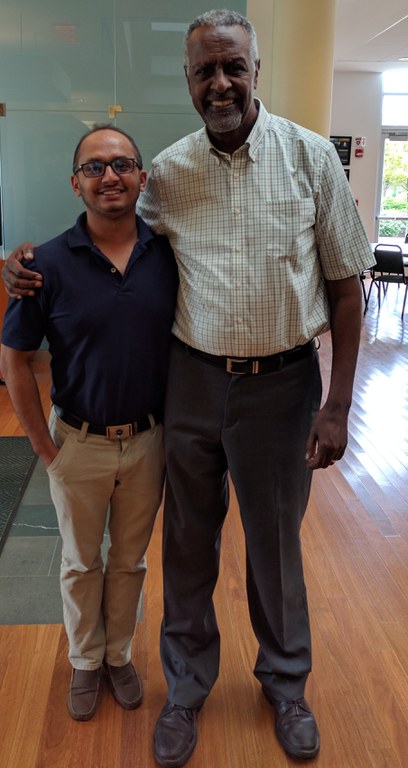Posted: June 22, 2017
The 2017 U.S Borlaug Summer Institute on Global Food Security at Purdue took place during July 4-17 bringing together 40 graduate students from all over the USA interested in areas of global food security. I was fortunate enough to be one of the 40 who were selected to represent the Borlaug’s vision of a world without hunger.
Submitted by Sulav Paudel
Food insecurity, when people do not have physical and economic access to sufficient, safe and nutritious food to meet their dietary needs and food preferences for an active and healthy life, is one of the worst forms of human suffering. The stakes for ensuring a food-secure world are already high, and rising. By 2050, the world needs to accommodate an additional 2.5 billion people, most of the growth will take place in small and medium-sized cities in Asia and Africa. Modern agriculture must face these challenges and young scientists and educators must be prepared for it. It is a 'wicked' problem.
The 2017 U.S Borlaug Summer Institute on Global Food Security at Purdue took place during July 4-17 bringing together 40 graduate students from all over the USA interested in areas of global food security. I was fortunate enough to be one of the 40 who were selected to represent the Borlaug's vision of a world without hunger.
In this two-week intensive course, I learned a holistic approach to understanding and addressing world food insecurity issues, and explored how social, economic, and political factors impact decision-making and can improve or compromise the biogeochemical interactions as they pertain to food production. Also, the complex, interrelated dynamics of this challenge was examined, which plays out on a global scale while manifesting differently in locality-specific conditions. Through various lectures, practicums and case studies, we also explored the factors that cause food insecurity (including climate, socio-economic disparities, and political). The module culminated with a summative assignment where participants were divided into groups and assigned a country to design an innovative food security project utilizing the concepts and approach learned during the institute.
The institute is a great place to understand the complexity of issues and bridge disciplinary boundaries for a better understanding of food security and insecurity. Also, the mix of participants from both US and outside made the experience enriching. One day, I was discussing with a fellow participant about the economic status of our countries. As both of us were from developing nations, we started talking about the current status, the underdevelopment and other various social and economic issues impeding the countries' development. He was very passionate about his country and wasn't pleased to be bracketed as a 'developing nation'. "I dislike the term 'developing world' because it assumes a hierarchy between countries, painting a picture of western societies as ideal. Also, this developed-developing relationship replaces the colonizer-colonized relationship. For example, the present-day development industry spends billions of dollars, but very little gets achieved. Therefore, I believe that things needs to be changed and I will do my best to change them." It was very apparent in his eyes how much he loves his country and how badly he wants his country out from that 'developing nation' tag.
While I was impressed with all the speakers, I must admit that Dr. Gabisa Ejeta stood out for me. Recipient of 2009 World Food Prize, he is the Director of Center for Global Food Security and also holds the position of Distinguished Professor at Purdue University. His two sessions on Global food security and Purpose-driven research were engaging, thought-provoking and inspirational, where he presented real-world, actionable content and strategies on how things can be changed. "Everything you do should be driven by a purpose' and "It's (food security or agriculture research) a marathon not a sprint" are two of the quotes from him which I believe I am taking with me wherever I go. For a man who so many admire and his many achievements, how humbly and submissively he carries himself was a great inspiration personally.
While I expected my experience in the institute to be exciting, I did not fully grasp how much the opportunity would positively impact me until I actually arrived and began interacting with professors, fellow participants, and speakers. As we were driving back to Penn State, Christian (a fellow participant) and I reflected on our experiences from the institute. We were unified in admitting how the two-weeks have triggered an internal transformation. Being immersed with a new thought process, different ideas and diverse companions has enriched our minds. Leaving Purdue and saying goodbye to the people I got to know for those two of weeks was very sad and difficult. Honestly, I wished the program lasted longer.
Lastly, the 'wicked problem' issue. Unfortunately even after two-weeks of an intensive course on food security, I don't think that I am able properly explain or come up with a solution. As one of the speakers rightly said, "Food security is a wicked problem. It is almost impossible to solve considering its size, scale and complex interconnections".
For all those interested in global food security, please apply to the Borlaug Institute- you don't want to miss this experience
INTAD
Address
Melanie Miller Foster106 Agricultural Administration Building
University Park, PA 16802
- Email mjm727@psu.edu
- Office 814-863-0249
- Fax 814-865-3055
INTAD
Address
Melanie Miller Foster106 Agricultural Administration Building
University Park, PA 16802
- Email mjm727@psu.edu
- Office 814-863-0249
- Fax 814-865-3055


